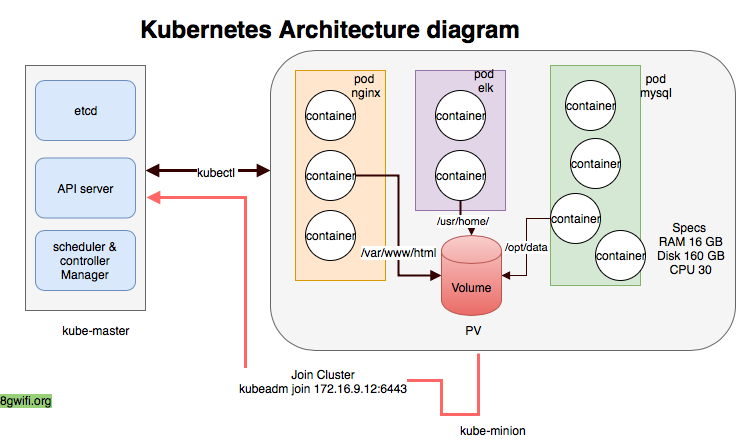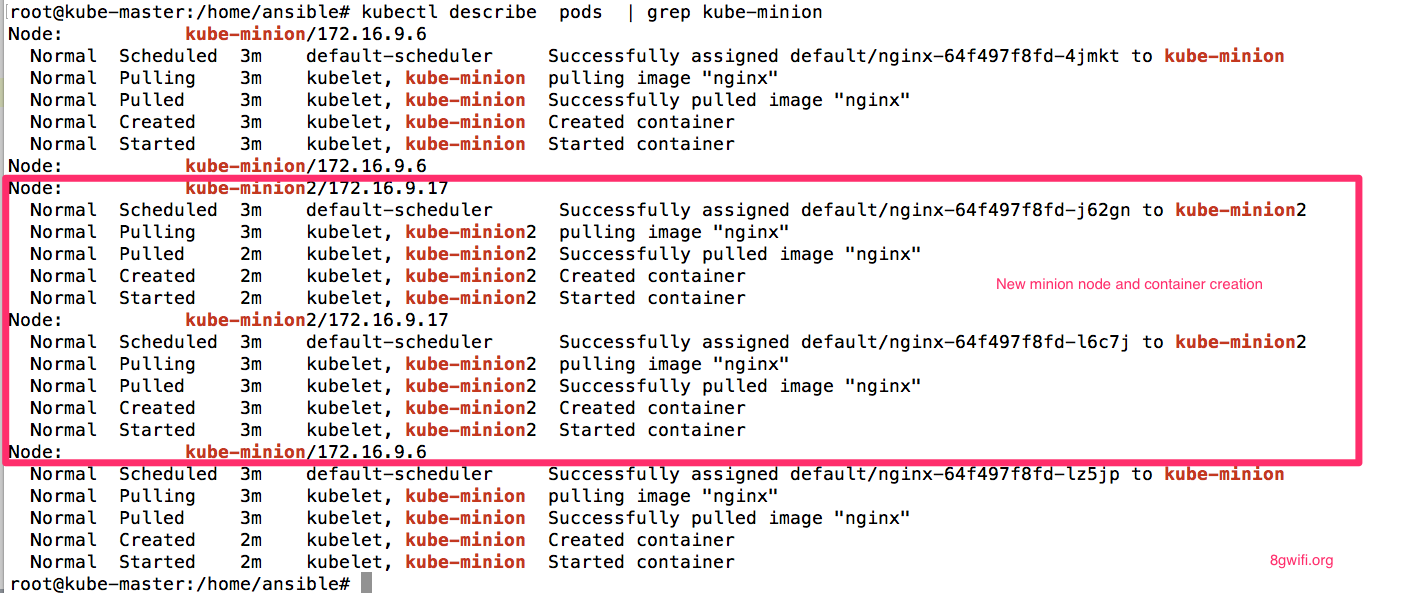kubernetes Pod,Cluster,Deployment,Replica Set Light Dive
by Anish
Posted on Tuesday July 17, 2018

Introduction
In this section we will learn the core concept of kubernetes like Pod,cluster,Deployment,Replica Set. The idea is to keep it simple and making more intuitive learning
At the beginning we have setup one master node and minion node
- kube-master
- kube-minion
kubectl - Main CLI tool for running commands and managing Kubernetes clusters. so what is the cluster
root@kube-master:$ kubectl cluster-info
Kubernetes master is running at https://172.16.9.12:6443
KubeDNS is running at https://172.16.9.12:6443/api/v1/namespaces/kube-system/services/kube-dns:dns/proxy
cluster consists of at least one cluster master and multiple worker machines called nodes
Verify the nodes which has join the cluster
root@kube-master:$ kubectl get nodes
NAME STATUS ROLES AGE VERSION
kube-master Ready master 18h v1.11.0
kube-minion Ready <none> 18h v1.11.0
Kubernetes API Resources
- po: Pod : Kubernetes pod is a group of containers that are deployed together on the same host
- svc: Service : A Service in Kubernetes is a REST object, similar to a Pod
- deploy: Deployment : A Deployment controller provides declarative updates for Pods and ReplicaSets
- rs: Replica Set : A ReplicaSet ensures that a specified number of pod replicas are running at any given time
Example : List all resources in the name space
kubectl get all

To List all supported resource types along with their shortnames, API group, whether they are namespaced, and Kind: run the kubectl api-resources
root@kube-master:$ kubectl api-resources
NAME SHORTNAMES APIGROUP NAMESPACED KIND
bindings true Binding
pods po true Pod
services svc true Service
deployments deploy apps true Deployment
replicasets rs extensions true ReplicaSet
clusterroles rbac.authorization.k8s.io false ClusterRole
rolebindings rbac.authorization.k8s.io true RoleBinding
.......
.......
Dig lighter to kubernetes flow
Start a single instance of nginx with one replicaset
root@kube-master:$ kubectl run nginx --image=nginx --replicas=1
The output will be deployment.apps/nginx created
Ok, so lets see if we actually have a Kubernetes pods up and running:
root@kube-master:$ kubectl get pods
NAME READY STATUS RESTARTS AGE
nginx-64f497f8fd-sqmjk 0/1 ContainerCreating 0 12s
The container is creating on nginx pod , again hitting the same command, this time shows pods are up and running
root@kube-master:$ kubectl get pods
NAME READY STATUS RESTARTS AGE
nginx-64f497f8fd-sqmjk 1/1 Running 0 46s
We can retrieve a lot more information about each of these pods using kubectl describe pod. For example:
root@kube-master:$ kubectl describe pod nginx-64f497f8fd-sqmjk
There will be big YAML output
......
......
Containers:
nginx:
Container ID: docker://a7bc2921ca62187778c5f65da4e139516f2701caf32e325cbeef2a1ee082da0b
Image: nginx
Image ID: docker-pullable://nginx@sha256:a65beb8c90a08b22a9ff6a219c2f363e16c477b6d610da28fe9cba37c2c3a2ac
Port: <none>
Host Port: <none>
State: Running
Started: Mon, 16 Jul 2018 18:48:53 +0530
Ready: True
Restart Count: 0
Environment: <none>
Mounts:
/var/run/secrets/kubernetes.io/serviceaccount from default-token-8wxrj (ro)
Here you can see configuration information about the container(s) and Pod (labels, resource requirements, etc.), as well as status information about the container(s) and Pod (state, readiness, restart count, events, etc.).
The container state is one of Waiting, Running, or Terminated. here you can see that for a container in Running state, the system tells you when the container started.
Ready tells you whether the container passed its last readiness probe.
Look for Events
Look for the event generated to perform this action kubectl run nginx --image=nginx --replicas=1 in the kubernetes master node
Events:
Type Reason Age From Message
---- ------ ---- ---- -------
Normal Scheduled 11m default-scheduler Successfully assigned default/nginx-64f497f8fd-7w5mn to kube-minion
Normal Pulling 10m kubelet, kube-minion pulling image "nginx"
Normal Pulled 10m kubelet, kube-minion Successfully pulled image "nginx"
Normal Created 10m kubelet, kube-minion Created container
Normal Started 10m kubelet, kube-minion Started container
In the Minion node docker images are pulled and container created and started , for docker background user can issue docker related command to see how docker & kubernetes are orchestrating the deployment
root@kube-minion:$ docker images
REPOSITORY TAG IMAGE ID CREATED SIZE
nginx latest 8b89e48b5f15 2 hours ago 109 MB
nginx <none> 3c5a05123222 10 days ago 109 MB
To list all events you can use kubectl get events
Get the deployment configuration of nginx by the command
root@kube-master:$ kubectl get deployment nginx
NAME DESIRED CURRENT UP-TO-DATE AVAILABLE AGE
nginx 1 1 1 1 6m
- DESIRED =1
- CURRENT =1
During the initializing state we have told the kubernetes to maintain one replica only by setting the flag --replicas=1
Delete the nginx pod
to delete the pod specify the pod name
root@kube-master:$ kubectl delete pod nginx-64f497f8fd-sqmjk
Query on pod still shows one pod is running with diffrent id, this happen because initially we have tell the kuberntes to keep one running replica always Great Kubernetes !!! you have save my production server from accidently destroyed
root@kube-master:$ kubectl get pods
NAME READY STATUS RESTARTS AGE
nginx-64f497f8fd-fg9q7 1/1 Running 0 1m
Scale Up the Pods
To scale up the pods tell to kubectl how many current replica is there (current-replicas) and how many needs to be scaled (replicas)
- DESIRED =3
- CURRENT =1
root@kube-master:$ kubectl scale --current-replicas=1 --replicas=3 deployment/nginx
In the background two new container will get created and will get deployed
root@kube-master:$ kubectl get pods
NAME READY STATUS RESTARTS AGE
nginx-64f497f8fd-brn22 0/1 ContainerCreating 0 17s
nginx-64f497f8fd-fg9q7 1/1 Running 0 2h
nginx-64f497f8fd-z2vbb 0/1 ContainerCreating 0 17s
After creating the containers check the status of these pods
root@kube-master:$ kubectl get pods
NAME READY STATUS RESTARTS AGE
nginx-64f497f8fd-brn22 1/1 Running 0 30s
nginx-64f497f8fd-fg9q7 1/1 Running 0 2h
nginx-64f497f8fd-z2vbb 1/1 Running 0 30s
Look at the events
kubectl get events

- DESIRED =1
- CURRENT =3
root@kube-master:$ kubectl scale --current-replicas=3 --replicas=1 deployment/nginx
deployment.extensions/nginx scaled
Pods are terminating
root@kube-master:$ kubectl get pods
NAME READY STATUS RESTARTS AGE
nginx-64f497f8fd-fg9q7 1/1 Running 0 2h
nginx-64f497f8fd-fpjk9 0/1 Terminating 0 35s
nginx-64f497f8fd-lk2pw 0/1 Terminating 0 35s
After scaling down only one nginx pod is running
root@kube-master:$ kubectl get pods
NAME READY STATUS RESTARTS AGE
nginx-64f497f8fd-fg9q7 1/1 Running 0 2h
Look at the events

Adding New Node to Cluster
To add new node to the kubernetes cluster requires token and discovery-token-ca-cert-hash
Forget your token :), first create a token using kubeadm command in the kube-master setup,
root@kube-master:$ kubeadm token create
I0717 10:32:47.753179 22047 feature_gate.go:230] feature gates: &{map[]}
yy8zho.n3w5inti3twy7v0y
Forget your discovery-token-ca-cert-hash ,
Get rooCA cert fingerprint
root@kube-master:$ openssl x509 -pubkey -in /etc/kubernetes/pki/ca.crt | openssl rsa -pubin -outform der 2>/dev/null | openssl dgst -sha256 -hex | sed 's/^.* //'
The outpted discovery-token-ca-cert-hash value30e3baf5cb4474b23d5d2500836f6b4da19fa629b64339b1301d3e04892e08aa
Once the Token is created join the new node name kube-minion2 using the token and tokencacert value
root@kube-minion2:$ kubeadm join 172.16.9.12:6443 --token yy8zho.n3w5inti3twy7v0y --discovery-token-ca-cert-hash sha256:30e3baf5cb4474b23d5d2500836f6b4da19fa629b64339b1301d3e04892e08aa
Checkout for the events kubectl get events
A set of event shows when adding a new node to the cluster

Now in this cluster we have two minion nodes and one master node
root@kube-master:$ kubectl get nodes
NAME STATUS ROLES AGE VERSION
kube-master Ready master 18h v1.11.0
kube-minion Ready <none> 18h v1.11.0
kube-minion2 Ready <none> 2m v1.11.0
Again Now scale up the nginx
kubectl scale --current-replicas=1 --replicas=5 deployment/nginx
Look for the Events to verify on the new node pods are created and nginx are deployed
kubectl describe pods | grep kube-minion

Well thats its for Today hope you have Enjoyed Learnign Kubernetes
Thanku for reading !!! Give a Share for Support
Your Support Matters!
Instead of directly asking for donations, I'm thrilled to offer you all nine of my books for just $9 on leanpub By grabbing this bundle you not only help cover my coffee, beer, and Amazon bills but also play a crucial role in advancing and refining this project. Your contribution is indispensable, and I'm genuinely grateful for your involvement in this journey!
Any private key value that you enter or we generate is not stored on this site, this tool is provided via an HTTPS URL to ensure that private keys cannot be stolen, for extra security run this software on your network, no cloud dependency
Kubernetes Related Topics
Linux Related Topics
Ansible Related Topics
Applied Cryptography Topics
Web Crypto API Topics
Openstack Articles
python Cryptography Topics
PHP Cryptography Topics
Topics
For Coffee/ Beer/ Amazon Bill and further development of the project Support by Purchasing, The Modern Cryptography CookBook for Just $9 Coupon Price
Kubernetes for DevOps
Hello Dockerfile